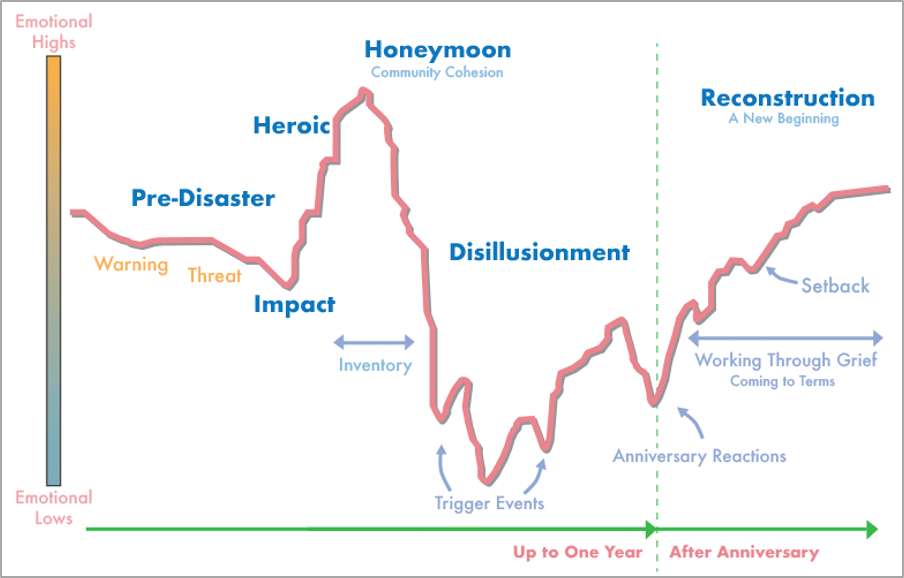Resiliency and Coping with a Crisis
 Resiliency refers to the ability to bounce back or move forward from an incident. Having the capacity to recover and adapt quickly from a difficult situation.
Resiliency refers to the ability to bounce back or move forward from an incident. Having the capacity to recover and adapt quickly from a difficult situation.
Every year millions of people suffer as a result of disasters and emergencies. Any significant loss, including material possessions, can result in a natural grieving process and all of us are affected by traumatic experiences in different ways. Following an emergency or disaster, a person may experience a range of thoughts, feelings and behaviour that can be intense, confusing, and frightening.
The grieving process may have peaks and valleys, and other events and past traumas may trigger emotional lows and highs, even up to years after the emergency. Crises have three psychological phases:
- Emergency: Shared clear goals and urgency make us feel energized, focused and even productive.
- Response: We realize the future is uncertain, lose our sense of purpose, get tired, irritable, withdrawn, and less productive.
- Recovery: We begin to reorient, revise our goals, expectations and roles, and begin to focus on moving beyond versus getting by.
Everyone’s journey is different and the time in each phase varies by individual. All these are normal reactions to an abnormal situation.

Every individual and community responds differently to a disaster and below is a graph that illustrates the four phases that people may go through with their mental health.
- Heroic Phase: After a disaster occurs, the few days following the disaster, people are feeling heroic appreciate of surviving, the assistance from first responders and neighbours.
- Honeymoon Phase: During this phase, relief assistance and compensation begins, media is providing significant coverage, faith and non-profit organizations are assisting, elected officials and VIPs are visiting expressing sympathy and talk of community restoration.
- Disillusionment Phase: Relief assistance starts decreasing, elected officials are not visiting, media coverage is dwindling. Individuals are creating their own recovery plan through insurance coverage.
- Reconstruction Phase: Reconstruction and rebuilding take time and money. Insurance may be ready to assist, however, resources and contractors are limited as everyone is using the same contractors. Mental health is waning, and mental health workers play a very important role during this phase as exhaustion is settling in and people may still be out of their homes.
Fear and anxiety are natural reactions to stressful events and can stir up past traumas. To help yourself and your loved ones:
- Accept offers of help
- Seek counselling or spiritual guidance
- Focus on positive memories and the skills you’ve used to get through other hard times
- Be aware of how children are reacting. Reassure them and encourage them to express themselves
- Give yourself and your loved ones permission to grieve
- Practice cultural or spiritual customs that bring you comfort
- Maintain daily routines and do things that normally give you pleasure.
- Eat healthy foods, get plenty of sleep and exercise if possible
- Visit with other people
- Accept support and assistance
- Allow yourself to feel sad and grieve
- Give someone a hug
- Take small steps
With support, most people recover within a few weeks; however, some will need more time and help to heal. Watch for warning signs of extended anxiety and contact a medical professional or trusted community leader if they last more than two to four weeks:
- Trouble with eating and sleeping
- Feeling depressed or hopeless; showing low energy or crying often
- Being anxious and fearful
- Trouble focusing on daily activities
- Recurring thoughts or nightmares
- Avoiding activities or places that are reminders of the event
These experiences trigger responses that are both physical and psychological, which are expected reactions to abnormal events, and can include physical, emotional, and behavioural reactions such as:
- Sleeping problems
- Headaches
- Muscle tension and bodily pains
- Fast heartbeat
- Nausea
- Anxiety
- Watchfulness
- Poor concentration
- Guilt
- Sadness
- Anger
- Confusion
- Having intrusive memories
- Trying to avoid being reminded of the crisis
Some people also react by feeling numb or not feeling anything at all, by struggling with day-to-day decision-making, or by isolating themselves from others. Some people increase their intake of alcohol, medicine, or drugs to escape the pain they are feeling.
Children’s Reactions
After a stressful experience, including those involving loss, children’s grief is often abrupt, and they may switch quickly from intense grief reactions to play and having fun. Almost all children play, even if they have gone through an intense crisis event.
Younger children may:
- Behave aggressively towards caregivers or other children.
- Cling to their caregivers.
- Show signs of separation anxiety.
- Regress to the behaviour of younger children such as bedwetting, thumb sucking or not being able to sleep alone./li>
In such situations, stable and secure relationships and establishing predictable routines contribute to a supportive environment.
When to seek help
The stress reactions may last several weeks. If your reactions persist and make it impossible to function normally over a long period of time, seek help. One option is to contact your local health facility or a local crisis support line.
You may also want to contact:
Useful Resources:


 Resiliency refers to the ability to bounce back or move forward from an incident. Having the capacity to recover and adapt quickly from a difficult situation.
Resiliency refers to the ability to bounce back or move forward from an incident. Having the capacity to recover and adapt quickly from a difficult situation. 